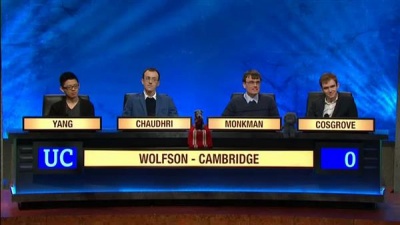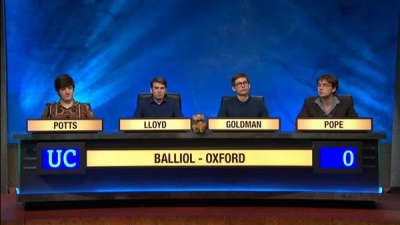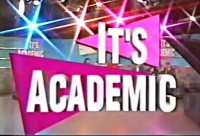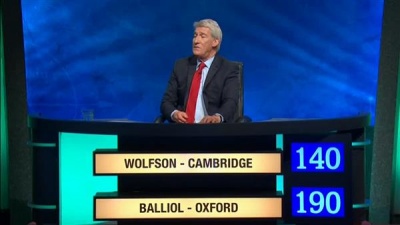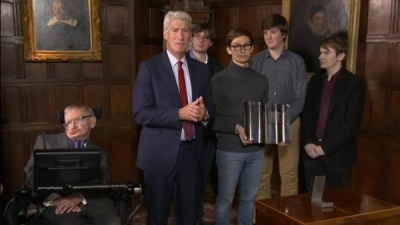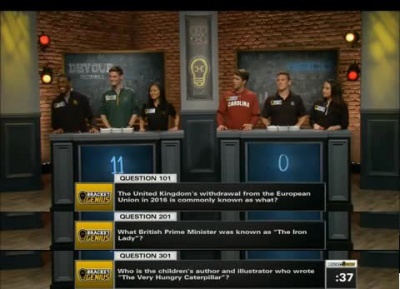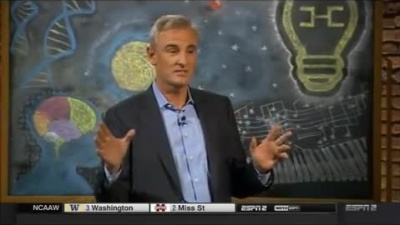Weaver's Week 2017-04-16
Last week | Weaver's Week Index | Next week
This week, we're writing around the topic. This isn't a blow-by-blow account, but a discussion of matters it brings to mind.
Contents |
University Challenge
2017 final, 10 April: Wolfson Cambridge v Balliol Oxford
And now the end is here. Boris and Theresa's dream of an all-"British" final is in another universe. Here in reality, we have a very cosmopolitan mix.
Wolfson Cambridge are represented by Justin Yang, Ben Chaudhri, Paul Cosgrove, and captain Eric Monkman. Monkman has been the University Challenge icon of the series, his exclamations are both loud and correct. He's got about two-thirds of his team's starters, and hasn't yet had an off-day.
UC has a habit of throwing up a cult hero, at least for the few weeks of the finals. The Royal Television Society pondered why University Challenge is so popular.
- To this day, the show attracts extensive coverage in the mainstream press. This tends to be around certain contestants, such as the current series' Eric Monkman, who has a habit of pulling unusual facial expressions.
- In 2009, Gail Trimble – captain of the Corpus Christi, Oxford, team – was dubbed the "human Google". And last year, the well-arched left eyebrow of Hannah Woods, captain of the 2016 winning team of Peterhouse, Cambridge, had two parody Twitter accounts set up in honour of her eyebrow.
With respect, that's an account of what happens, it's not an explanation. Our view is that University Challenge is a sort of virtue signalling, something that people watch – and say they watch – for credibility amongst their friends. Amongst the three million viewers, there might be 30,000 fans who will buy a paper to learn more about Monkman, or Guttenplan, or Karran, or whoever is this year's meme.
This year's meme shows his knowledge of Lord Russell, the peace of Westphalia, and The Magic Flute. It's 65-25 after the first picture round.
Balliol Oxford have the team Freddie Potts, Jacob Lloyd, Ben Pope, and captain Joey Goldman. Goldman is the team's best buzzer, securing about half the team's starters so far. Potts strikes back with a fast buzz on the Greek letter sigma, and – with the help of a couple of missignals – Balliol take the lead.
Diversity and "academic" knowledge
Back to the RTS, where they're looking at the scandal of the autumn: why are there so many white men on this show?
- Casting for the show is a long and exacting process. The emphasis is on the ability of contestants to answer the questions. Each university has its own process of selecting candidates to be shortlisted for auditions.
- ITV Studios whittles down around 130 teams to 28 via further academic testing and interviews that establish whether the students would work well on television.
- Giles Hutchings {captain of Warwick's team} believes that the producers make a genuine effort to create a diverse show. As a result, teams often try to attract women in the hope that this will improve the chances of ITV Studios placing them on the show.
If this is the case, we broadly approve. The show needs to be entertaining, and week after week of interchangeable white men is not entertaining.
Over at the New Statesman, Hannah Woods (from last year's champion team) has blamed the sexist and hypocritical newspapers. We agree: not only are sexist newspapers a problem, but the hypocritical Fourth Estate as a whole is given far more importance than it merits. And we endorse her conclusion:
- And to any women who are hesitant to take part in University Challenge, I have a plea. Please audition. Please take part. It is ridiculous that, in 2017, media attention will follow you around for a bit, pointing out in various ways that you are, in fact, a woman. You shouldn't have to deal with this crap. But please don't stop auditioning.
The questions still have a bias towards traditional "academic" subjects – classical composers, Greek mythology and Renaissance literature. In the past, Paxman has openly sneered at anything "pop"; these days, his contempt is a little more subtle.
Too often, "academic" is code for "white and male". Universities shape thought and policy, and they're hearing more from diverse thinkers. But University Challenge remains a little behind the curve, white Eurocentric culture is still prized. There's at least one question every week about (dead man writer) Little Billy Shakespeare, and we hear nothing about (living women writers) Danielle Steel, Daisy Meadows, or Stephanie Meyer.
To be fair, University Challenge might grump and grouch, but the show tolerates pop culture. College Bowl and its successors hate non-academic questions, they lump sport and pop culture together under the pejorative title "trash". Some argue that the "academic canon" is all one needs to know to win quizzes, but is this entertaining to the casual viewer? Indeed, is it knowledge, or just memory? By including a dab of pop culture, University Challenge tries to ensure its champions have to have knowledge, and must keep learning each year.
Only Connect has shown that diverse questions can help to build a broad community. The Chase shows that great dollops of pop culture doesn't always lead to a bad show. For our money, University Challenge comes across as much more stuffy and insular than its modern competitors.
How hard can a quiz be?
Tonight's quizzing is of very high standard. Wolfson drew level at the audio round, and then Tudor executions and Queens Christina help to build a new lead. It doesn't last: Monkman gives the derivation of "Moho" when they're expecting the contraction, and suddenly Balliol are back level.
Back to that Royal Television Society piece.
- Jack Waley-Cohen, questions editor on Only Connect, believes that the key to the show's long-running success lies with the contestants. 'People love seeing people being really, really clever,' says Waley-Cohen. He characterises the tone of the show as 'more inquisitorial' and 'more of a hard-core, serious quiz show than Only Connect'." He says that good teams and stand-out individuals within those teams help drive audience numbers.
David Stainer, a finalist in 1999, told the RTS,
- "The question setters are quite skilled at adapting the questions over time to suit the way underlying knowledge changes. The questions now are very, very different to during Bamber Gascoigne's time, but I suspect that they are also different to the early years of Paxman."
- "I remember that there was a period when, watching at home, I thought the questions had got rather obscure. But the producers always seem to realise that they need to sort it out and it goes back to the right level of difficulty."
Judging the right level of difficulty is an art. The practical arrangements don't help. University Challenge has a very tight filming schedule, about eight weeks in the spring. If teams aren't as strong as expected, there isn't time to send for better questions. There are going to be low-scoring shows, and low-scoring years. The producers take that risk.
As regular readers know, we've grown cold on University Challenge in recent series. Paxman was rubbing us up the wrong way, and though he's stopped bullying the students, we still think it's past time for him to retire with grace. Some of the adjudications are dubious – including one tonight – and many of the questions were too hard for the teams. This year, the questions have been pitched better for the teams. Whether that's because the questions are a mite easier, or the teams a mite better, is not going to be known.
What we do know: there's too much University Challenge. The main tournament sprawls over eight-and-a-half months, and losing a match may – or may not – eliminate a team. Open University are the only unbeaten team this year, eliminated in the round of 16 after a win and a draw.
We also know is that tonight's show has turned into a captain's duel. Eric Monkman of Wolfson will buzz in on 12 questions, and score on 7. Joey Goldman will buzz on 7, and score on 5. Neither captain lets anyone else in during the last ten minutes of contest.
Goldman knows about "justify" as a Platonic ideal. Monkman knows about the career of Macbeth. Goldman takes cities in countries ending in L, Monkman the Shakespeare characters beginning CY.
But in this final stage, Goldman takes three starters and all nine bonuses. Monkman gets two starters, three bonuses, and a missignal penalty. At the gong, Balliol have the bigger score, 190-145.
Quality buzzing got them both where they are, but we always reckoned Balliol had the little extra strength in depth. Goldman and Pope got the starters, Potts and Lloyd converted the bonuses. Until the final, we never knew what would happen if Monkman had an off day. Now we know.
The trophy is presented at Gonville and Caius Cambridge, by Stephen Hawking. The best team won, and we hope that the next series is as entertaining as the one just ended.
Bracket Genius
Based on two-thirds of an episode, ESPN2, 22 March
University Challenge is based on the television student quiz College Bowl. This original format was discontinued in 2008. A plethora of quiz contests fills the gap for students of all ages, but none of them are televised.
Into this gap steps ESPN, the Disney Corporation's sports channel. They're offering $100,000 (about £80,000) to the champion team. Playing quiz for cash, eh.
Sixteen teams take part in the contest. Unlike University Challenge, the teams haven't qualified on their own merits. We're not going to see the best student quizzers on this show. Teams qualify for Bracket Genius because their university's men's basketball team has made the last 16 in the NCAA championships. The draw for Bracket Genius is identical to that of the basketball tournament.
Let's apply this logic to University Challenge and men's rugby sevens. We would have familiar names, like Exeter, Durham, Bath, Nottingham. Sports-and-academics university Loughborough would surely qualify every year. We also meet specialist institutions like Hartpury College and Bishop Burton, famed for rugby but little else.
But we digress. Bracket Genius features teams of three standing at a common podium. When someone buzzes, we'll be able to see which player buzzed, as the team's light is split into three parts.
All the questions are on the buzzer. All of them. This isn't a starter-and-bonus game, this is a starter-and-starter-and-starter game. There's no conferring, except on questions handed over because the first player buzzed wrongly.
There is a reward for getting the right answer – your team selects a difficulty level. Questions can be worth 1, 2, or 3 points. The questions – but not the answers – are shown on screen. ESPN knows that some of the audience will be watching in a bar, or with the sound turned down, and wants to give them some reason to keep watching.
The matches are brief, each lasts about five minutes – there's a clock graphic on screen for the first few seconds, and for the last minute. Three matches fill the half-hour slot, reducing four teams to just one.
The questions were short and snappy, but still told a story. We've never liked how University Challenge turns every question into a long essay; having to fit the question on screen is a fine discipline.
But the questions were in no way hard – most of them would fit into The Chase. ESPN doesn't want to turn off its regular audience, whatever its regular audience at 5pm Eastern is. So it asks questions that most people can get, and the programme turns into a buzzer race.
We found that Bracket Genius lacks pace – host Trey Wingo is pedestrian, and never injected any urgency into proceedings. To be fair, it didn't help that both games we saw were one-sided blowouts, maybe he's better with actually close games.
Presentation – the set has a lot of exposed brickwork (or wallpaper pretending to be). And blackboards filled with nonsense – and the sponsor's logos. There was no audience: perhaps we were meant to believe that Wingo had snuck into a lecture room while all the sportsball people were away doing their sportsball.
Awful Announcing, a sports fan site, said, "If Wingo and company can make this engaging and fresh, it might be good content for ESPN2 during a pretty slow sports time (at least, slow for them considering their lack of NCAA tournament rights). If it feels like every other quiz show, though, it may wear out its welcome. This may be worth keeping an eye on, especially for the response."
From this side of the pond, we reckon it's an interesting experiment. A feelgood show, professional, and quite likely funded by the advertisers. Viewing figures were slightly below the slot average, around 100,000 for all episodes on ESPN2, but the shows repeated well on the college sports channel ESPNU.
Engaging and fresh? Only by being brief: the entire series wrapped up in four ESPN hours, and that included some extra challenges for the semi-finalists to win bonus money. (On the BBC, that's about 2 hours 45: University Challenge would not eliminate a team from its group matches.) We wouldn't say this cannot be renewed, but nor is it a huge enough hit to force another series.
A 16-team tournament is about right: we certainly wouldn't want to slog through a complete 64-team elimination series. Nor do we see much market for this as a university-level competition. Frankly, it wouldn't be a bad format for primary-school quiz Top Class, but that ship is already at sea.
This Week and Next
The Television BAFTA awards are looming, and nominations came out this week. These are the game nods.
Taskmaster is nominated in the Comedy and Comedy Entertainment Programme category.
Claudia Winkleman of Strictly Come Dancing is nominated in Entertainment Performance. A notable absence of Ant and Dec in that award.
Entertainment Programme features Ant & Dec's Saturday Night Takeaway, Britain's Got Talent, and Strictly Come Dancing.
The Great British Bake Off gets a nod in Features.
Ed Balls and his performance of Gangnam Style is up for Must-See Moment, a popular vote.
Winners will be announced on 14 May.
C1R has withdrawn from the Eurovision Song Contest. The channel's chosen performer, Julia Samoilova, has been unable to secure a visa to compete in Kyiv. C1R declined an offer to participate by video link.
Good news for our left-pond viewers, Big Star's Little Star is coming to USA Network. Bad news: it won't be hosted by Stephen Mulhern. Good news: it will be hosted by Cat Deeley. The series – featuring celebrities and their very young children – begins at the end of next month, according to a press release.
The points-winning answers from Bracket Genius: Brexit, perpetual quiz answer Mrs. Margaret Thatcher, and Eric Carle.
BARB ratings in the week to 2 April.
- Broadchurch (ITV, Mon) remains the top show, with 10.3m viewers this week. Saturday Night Takeaway (ITV) the top game, with 6.8m.
- Masterchef (BBC1, Wed) returned with 5.35m viewers. BBC The Voice (ITV, Sat) had 4.65m for the first half of the final. Sunday's conclusion was seen by 3.7m, little more than half the first-night figure.
- On BBC2, University Challenge (Mon) scored 3.1m for Monkman-Seagull. Only Connect (Fri) attracted 1.95m, and Robot Wars (Sun) 1.45m.
- Celebrity Juice (ITV2, Thu) was top of the digital channels, but the move to 10.30 has pulled it down to 940,000 viewers. Hell's Kitchen (ITV2, Tue) had 405,000, and Mock the Week (Dave, Thu) 240,000.
- Elsewhere, 205,000 for Next Top Model (Lifetime, Thu), and 140,000 for The Joke Machine (CBBC, Thu).
Get your eggs ready, Culinary Genius is a new cookery elimination format (ITV weekdays). Don't Ask Me Ask The Viewers (ITV, Tue) tries to predict how the Grate Viewing Public will vote in advisory polls.
Plenty of banter with new series of Debatable (BBC2, weekdays), The News Quiz (R4, Fri), and Have I Got News for You (BBC1, Fri). And it's the final of Robot Wars (BBC2, Sun).
Photo credits: Granada, ESPN.
To have Weaver's Week emailed to you on publication day, receive our exclusive TV roundup of the game shows in the week ahead, and chat to other ukgameshows.com readers, sign up to our Yahoo! Group.
Last week | Weaver's Week Index | Next week


